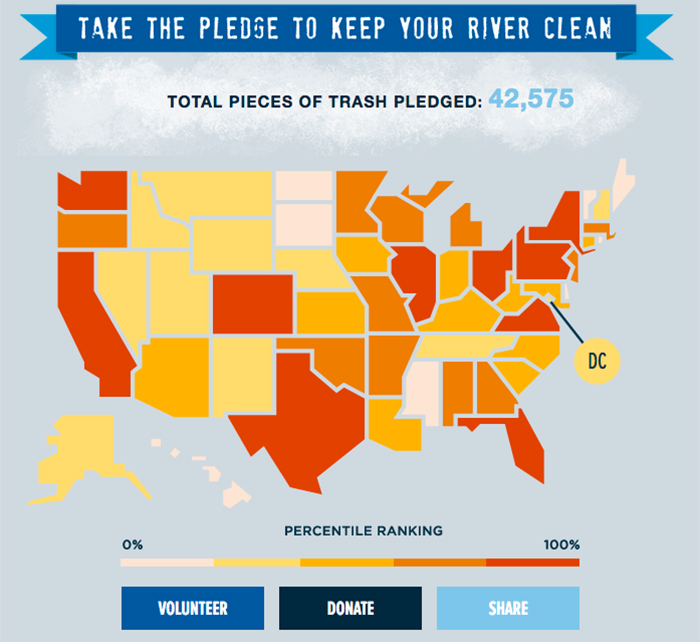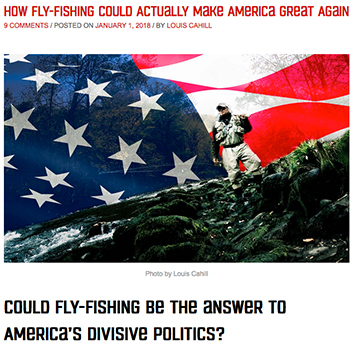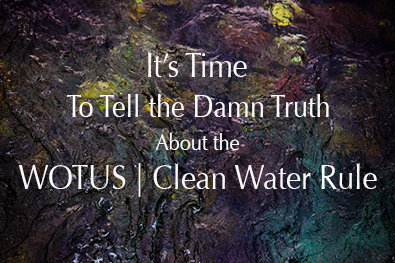Plying the old adage of better late than never, and hiding behind the excuse of several weeks of the flu from hell over the Holidays, here’s a belated New Year’s challenge for fly fishers in three parts.
Get Moving with American Rivers’ River Cleanup Pledge

While hash-tagging for the cause de jour qualifies as activism in many circles today, we’d encourage you to make sure you’re actually doing something tangible every month this year to improve the condition of your favorite river, creek, crick, bayou, flat, or other waterway.
American Rivers is spot on target with their River Cleanup Pledge campaign – join others across the country and pick up 25 pieces of trash in 25 days (though good fishers are picking up trash every time out anyway).
Let’s Grow the Sport Thoughtfully
Data abounds showing declining numbers (participation rates) of fishers and hunters over the past several years (if not decades); while impressive on a number of fronts, the data isn’t all that surprising as our country becomes more urbanized, digitized, and distracted.

Programs like Orvis’ 50/50 On The Water are laudable, focusing on engaging and equipping women to enjoy the world of fly fishing, though I’d sure like to see some of “the bigs” in the industry get behind programs to get more kids interested – youth engagement will be what eventually keeps fly fishing (among other outdoor pursuits) afloat and preserves your favorite waters over time.
Mentoring a new fisher (regardless of their age or sex) takes time, commitment, attention to detail, and some effort – traits that most fly fishers have honed to a higher degree than their non-fishing friends just by the nature of fly fishing itself.
Put that damn phone down and show a kid the wonders of the fly fishing world.
It’s Time for the Big Kids to Roll Up Their Sleeves and Address The Issues, But…
 If you haven’t read Louis Cahill’s post over on Gink and Gasoline – Could Fly Fishing be the Answer to America’s Divisive Politics? – click on over and invest three minutes doing so. As with most things Louis writes, his point is wrapped around a good story presented in a well-thought out package.
If you haven’t read Louis Cahill’s post over on Gink and Gasoline – Could Fly Fishing be the Answer to America’s Divisive Politics? – click on over and invest three minutes doing so. As with most things Louis writes, his point is wrapped around a good story presented in a well-thought out package.
His call for exercising a bit more respect and empathy is spot on, and our country (and the world) would be a far better place if even tiny measures of those traits were exercised on a daily basis.
Honing things down to the fly fishing world, there are plenty of challenges facing our nation (and the world) in the arena of being prudent stewards of the natural world around us; it goes without saying there’s a huge spectrum of opinions as to how to best meet those challenges we face.
Exercising a bit more respect and empathy towards those with whom we disagree, as LC suggests, will certainly help, but there’s another critical piece of the puzzle that need be added into the mix.
That missing piece of the puzzle is to make damn sure we’re working hard to solve these challenges using all the facts (yep, that means good science, accurately reported history, and at times the full legal trail) and telling the whole story accurately and honestly.
Here’s a great example – the Clean Water Rule (WOTUS) discussion – which is of course ongoing and currently awaiting an intermediate ruling from SCOTUS. Why do some of the bigs (TU, TRCP, American Rivers) insist on not telling the full and accurate story about the CWR?
I haven’t the slightest idea, though the post above suggests some possibilities, and I’d encourage you to more and more ask “why did they (insert your favorite advocacy group, politician) say that?”; if you can’t easily answer that question or it doesn’t point to an obvious solution, you’re probably following the wrong leader.
The point is simple – we need to support people and teams that are interested in solving problems, not prolonging partisan bickering. It’s past time for the big kids to step up, roll up their sleeves, and start working out solutions instead of pointing fingers, throwing tantrums, and continuing to divide.
I for one still think, however naively, that solutions to challenges we face – like preserving clean waters for future generations as an example – can and will be found; look at the improvements that have transpired from the 70s to today. I doubt very seriously it will come from Congress (who hasn’t been able to tell their own ass from a hole in the ground for decades) or from any current advocacy group who headquarters in Washington (prima facie evidence they believe political solutions are the primary answer).
Real solutions will come from real folks like you and I, folks who actually use, genuinely respect, and love the waters and countryside we wander.
Lets git ‘er done.

